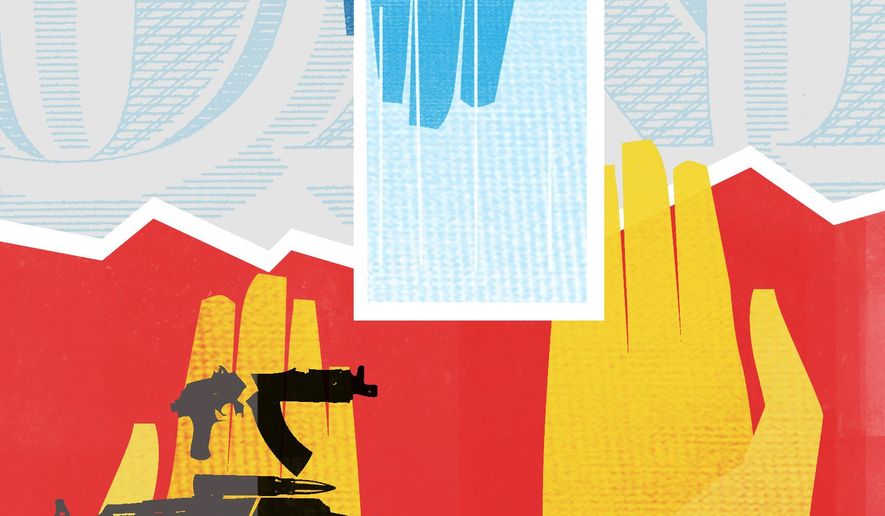OPINION:
Hezbollah is a terrorist organization. Last week, Germany found the courage to say so.
“Interior Minister Horst Seehofer has banned the operations of the Shiite terrorist organization Hezbollah (Party of God) in Germany,” the government forthrightly announced. Among the operations no longer permitted: Recruiting fighters to defend the blood-soaked, Tehran-supported dictatorship in Syria.
Just prior to the announcement, German police raided several “mosque associations” suspected of belonging to Hezbollah. “The activities of Hezbollah violate criminal law, and the organization opposes the concept of international understanding, whether in its political, social or military structures,” the government statement added.
Germany joins a growing list of countries that have officially recognized Hezbollah for what it is, and prohibited it from advancing its goals, and those of the Islamic Republic of Iran, its father and master, on their soil. Among them: Britain, Canada, the Netherlands, Argentina, Colombia, Honduras and Kosovo. Also Israel and the 22-member Arab League. Saudi Arabia and Bahrain issued statements welcoming the German decision.
You’ll note that France is not on this list, and while the European Union in 2013 imposed a ban on Hezbollah’s “military wing,” it gave a pass to the group’s “political wing.”
This is a fictional distinction. “Hezbollah is a single, large organization,” spokesman Ibrahim Mousawi said in 2012, just after Hezbollah terrorists blew up a tour bus in Bulgaria, killing five Israelis and a Muslim bus driver. “We have no wings that are separate from one another.”
Richard Grenell, the U.S. ambassador in Berlin, deserves kudos for persuading Germany to take this step. In his other job, acting director of national intelligence, he’s making the case in Paris and Brussels that pretending terrorists are not terrorists is a mug’s game.
In response to Germany’s announcement, Iran’s rulers, the world’s leading sponsors of terrorism as judged by the State Department in Democratic and Republican administrations alike, issued what sounded like a threat: “The German government must face the negative consequences of its decision.”
It strikes me that an opportunity has opened. In Lebanon, Hezbollah’s militia is so powerful that the Lebanese Armed Forces (LAF) refrain from challenging it in any meaningful way. Not just coincidentally, Hezbollah and its political allies effectively control the Lebanese government.
Last week, Hezbollah graciously announced that it would not stand in the way of that government accepting billions of dollars from the International Monetary Fund — so long as the IMF asks only for “reasonable conditions.”
IMF assistance is under consideration because Lebanon is in the midst of the most severe economic crisis in its modern history. Its currency has lost more than 60 percent of its value in recent weeks, and it has defaulted on its sovereign debt for the first time ever. Unemployment is skyrocketing.
“The Lebanese economy is in free fall,” reads the opening line of a five-year recovery plan the Lebanese government endorsed shortly after Hezbollah gave its limited blessing to an IMF bailout. “An international financial rescue package is urgently needed to backstop the recession and create the conditions for a rebound.”
The plan, not yet made public, will no doubt include restructuring the decrepit banking sector, along with various measures intended to combat widespread corruption.
That should not be enough. The United States, Germany and other major contributors to the IMF ought to demand that before any checks are written, Hezbollah disarms — that, from now on, it seeks power based on the ballots it can garner rather than the bullets it can fire.
I know what you’re thinking: Hezbollah will never agree, and the LAF, despite the assistance it receives from the U.S. and Europe, is too weak to force the terrorists to lay down their arms. In that case, the “international community” should tell the Lebanese government: “Perhaps Hezbollah’s patrons in Tehran can offer a better deal.”
OK, if you think that’s unrealistic, here’s a fallback: Hezbollah merely removes the estimated 150,000 missiles it has aimed at Israel — as was promised by the U.N. Security Council resolution that halted the war between Israel and Lebanon in 2006.
The purpose of making that demand would not be to demonstrate that U.N. Security Council resolutions aren’t worthless, nor out of consideration for Israeli lives, but because it would be foolish to invest billions of dollars in a country that Hezbollah, at Tehran’s behest, might drag into a devastating war at any moment.
If even that seems too big a lift, I’ll suggest a further fallback. Iran’s rulers have been giving Hezbollah precision-guided munitions (PGMs), as well as kits that enable Iranian-trained Hezbollah technicians to transform dumb rockets into smart missiles. Because these weapons have the potential to defeat Israeli missile-defense systems, especially if fired in sufficient numbers, it’s likely only a matter of time before Israelis decide their least-bad option is to remove them by military means.
Hezbollah has installed many if not most of these missiles in mosques, schools, hospitals and homes. That’s a blatant violation of international laws prohibiting the use of human shields, and it guarantees high numbers of civilian casualties.
Rather than waiting for that tragedy to unfold, would it not make sense for the United States, Germany, France and other civilized countries to couple diplomacy with economic incentives so as to diminish the threat that Hezbollah’s weapons pose?
The alternative is for the West to shore up a terrorist organization that answers to terrorist sponsors in Tehran, and holds the Lebanese people hostage. To do that would not be courageous. To do that would be irresponsible and downright stupid.
• Clifford D. May is founder and president of the Foundation for Defense of Democracies (FDD) and a columnist for The Washington Times.




Please read our comment policy before commenting.